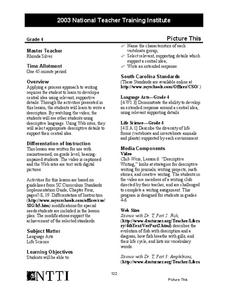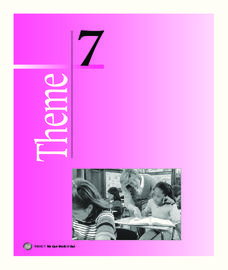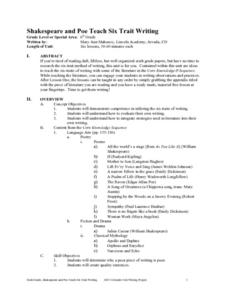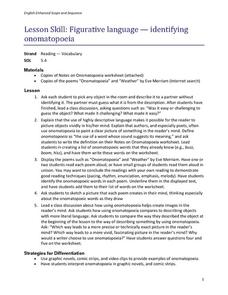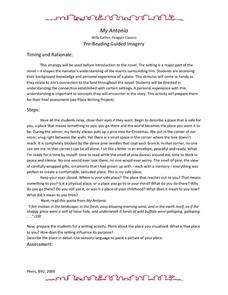Curated OER
Borrowing Narrative Skills from Mr. Fletcher: Using a "Prompts in Reverse" Technique to Inspire Your Writers
Help your class find their writing voices with this lesson which uses the work of Ralph Fletcher to guide a "Prompt in Reverse" activity. Using the chapter "First Pen" from Fletcher's Marshfield Dreams, learners decipher what they...
Curated OER
Write a Description
Finding the central idea is the focus of this instructional activity. Middle schoolers write descriptions of different animals using details and descriptive language. They watch a video of kids using descriptive language, and then use...
Houghton Mifflin Harcourt
We Can Work It Out: English Language Development Lessons (Theme 7)
Listen, look, speak, and move are the routine steps of the English language development lessons found in a We Can Work It Out themed unit. Language proficiency is reinforced through picture cards, poems, and grand discussions about...
Western Illinois University
Activities for Supporting Oral Language Development
Support young scholars' oral language development with the use of four early childhood activities. To reinforce proficiency, pupils read with an adult, play a game of telephone with their peers, put on a play with puppets or stuffed...
Curated OER
Shakespeare and Poe Teach Six-Trait Writing
A Six-Trait Writing instructional activity helps your middle schoolers liven up their word choice and shows them how to evaluate their own writing. Class members take a close look at the language used in poems by Shakespeare, Kipling,...
Curated OER
Descriptive Writing Using the Book Rumpelstiltskin
Use the fairy tale Rumpelstiltskin to teach your third grade class about descriptive writing. Following a teacher read-aloud of the story, the class brainstorms a list of adjectives describing the main character. Students use this list...
Curated OER
Descriptive Writing: Using Art to Inspire description
Write with the senses! Try using art to inspire writers to consider all of the senses. Here, the class is divided in half. Each group looks at one of two images, imagines the senses that would be engaged, and records answers to five...
EngageNY
Preparation for Performance Task: Using Writing to Make Prompt Cards
Writing becomes dynamic in a presentation. Presenters transform a piece of writing they have already composed about the Little Rock Nine into a presentation. The focus is transferring ideas from their writing into short prompts on cards...
Curated OER
Language Arts: Telling a Painting's Story
Use art museum paintings as inspiration for your class's creative writing works. Observing the paintings closely, middle and high schoolers list details and write descriptions. Their completed stories are displayed on bulletin boards...
K12 Reader
Using Similes
Your class will find using similes as easy as pie after completing this figurative language exercise. Provided with a list of incomplete similes, young writers must use their creativity to fill in the blanks with nouns that accurately...
Curated OER
Using Figurative Language
Adding details and figurative language makes any story more fun to read! After reading two versions of the same story, one devoid of figurative language and one embellished, young writers are asked to add alliteration, hyperbole,...
Curated OER
Discovering Descriptions
Delve into the journey of Lewis and Clark using this lesson on Missouri. After sharing books on Lewis and Clark's journey across the United States, pupils discuss the descriptive language used in their writing, and come up with their own...
Curated OER
Figurative Language- Identifying Onomatopoeia
A study of onomatopoeia for 5th graders is here for you. Pupils discover that the use of highly descriptive language makes it possible for readers to picture objects in their minds. After engaging in a class discussion and listening to...
Curated OER
Metaphors
Metaphors open doors to descriptive language for your poets. They read the poem "What is the Sun" and record all the metaphors they find. Then, scholars change one of them to a simile. After answering two more comprehension...
K20 LEARN
Brushstrokes: Communication/Using Descriptive Language
Sometimes a picture reflects a thousand descriptive words. To illustrate the importance of sensory words in descriptive writing, scholars listen to a song and craft a painting in response. After sharing their work with the class,...
Practice Using Lively Language
Practice Using Lively Language
Combine a study of biography writing with some tips for spicing up writing. After reading two passages, one much more descriptive than the other, pupils examine what makes one more interesting. They then brainstorm some ideas for writing...
K12 Reader
Figurative Language: Edgar Allan Poe’s “The Bells”
Bells, bells, bells abound in a instructional activity designed for Edgar Allan Poe's famous poem "The Bells." Middle schoolers are asked to identify the various poetic devices Poe employs.
PBS
Copyright and Fair Use
When is using someone else's copyrighted material appropriate? Learn about copyright and fair use with a lesson from PBS.org. Scholars read through a reference sheet about authors' rights and users' rights, and then create posters...
K12 Reader
My Favorite Food
Everyone has a mouth watering, delectable delicacy that they can talk or write about. Pupils will use this writing prompt worksheet to not only detail their favorite food in writing, but also illustrate what they are...
University of North Carolina
Clichés
When it comes to writing, cliches are as old as dirt. A handout on tired phrases provides examples of cliches, as well as a description of the negative effects they have on a paper. Writers discover specific words and phrases to avoid,...
Scholastic
Comprehension During Independent Reading
Ideal for a language arts class, literary unit, or independent reading assignment, a set of reading worksheets address a wide array of skills. From poetic elements to nonfiction text features, you can surely find a valuable resource in...
Curated OER
Description Quiz
Several things are missing in each picture, can you identify the missing objects? There are two descriptions here: one for a landscape, and the other shows a classroom setting. After reading the descriptions of each (in French), your...
Curated OER
My Antonia: Prereading Guided Imagery
What makes a place safe? What makes a setting effective? Explore the safe spaces and descriptive language with a prereading activity for Willa Cather's My Antonia. The teacher describes his or her own safe space and then prompts pupils...
Read Works
The Language of Setting
Descriptive language can be used to create a vivid and imaginative setting. Create the chart suggested in this plan to track the descriptive language found in The Wizard of Oz by L. Frank Baum. The class discusses the land beyond...



